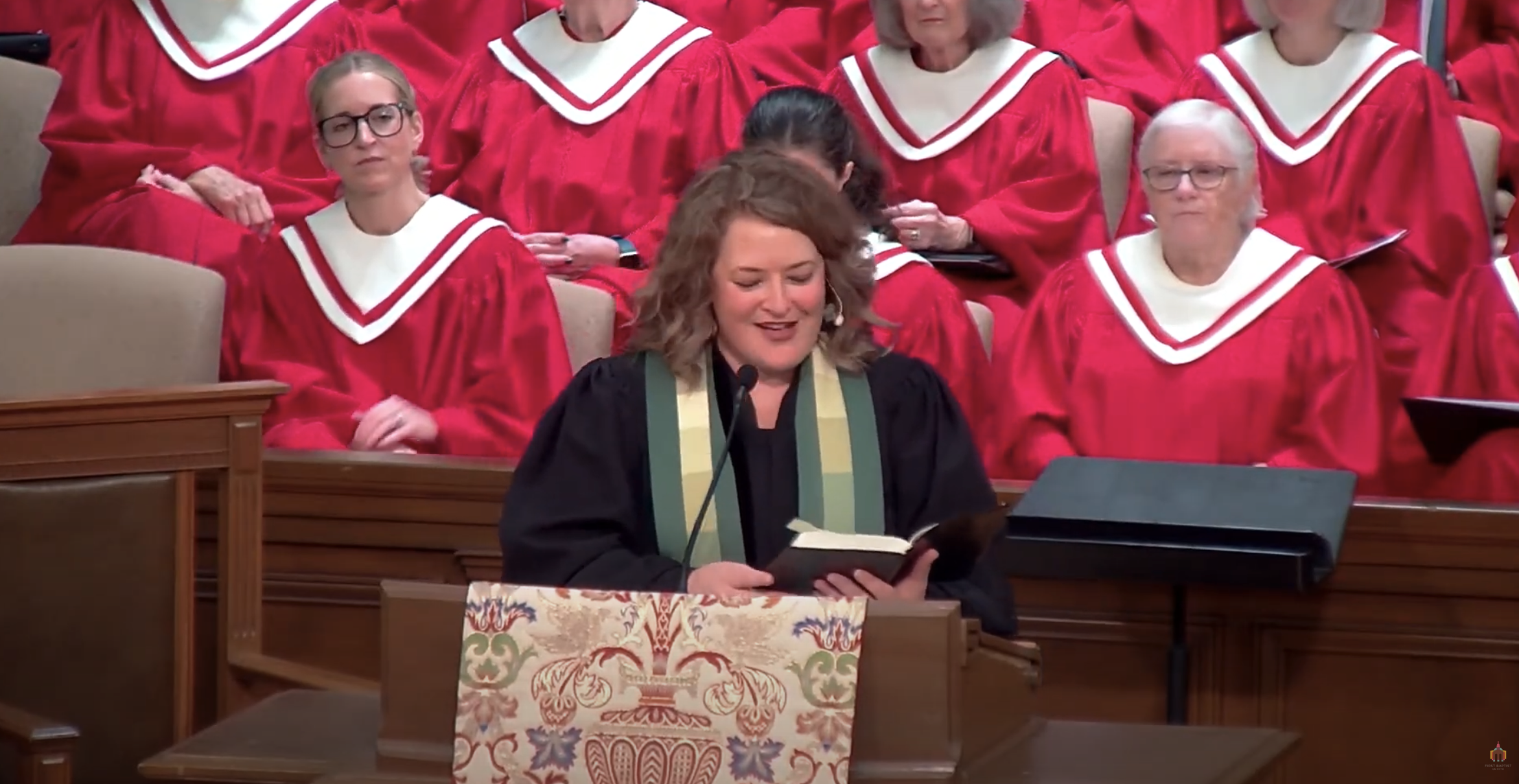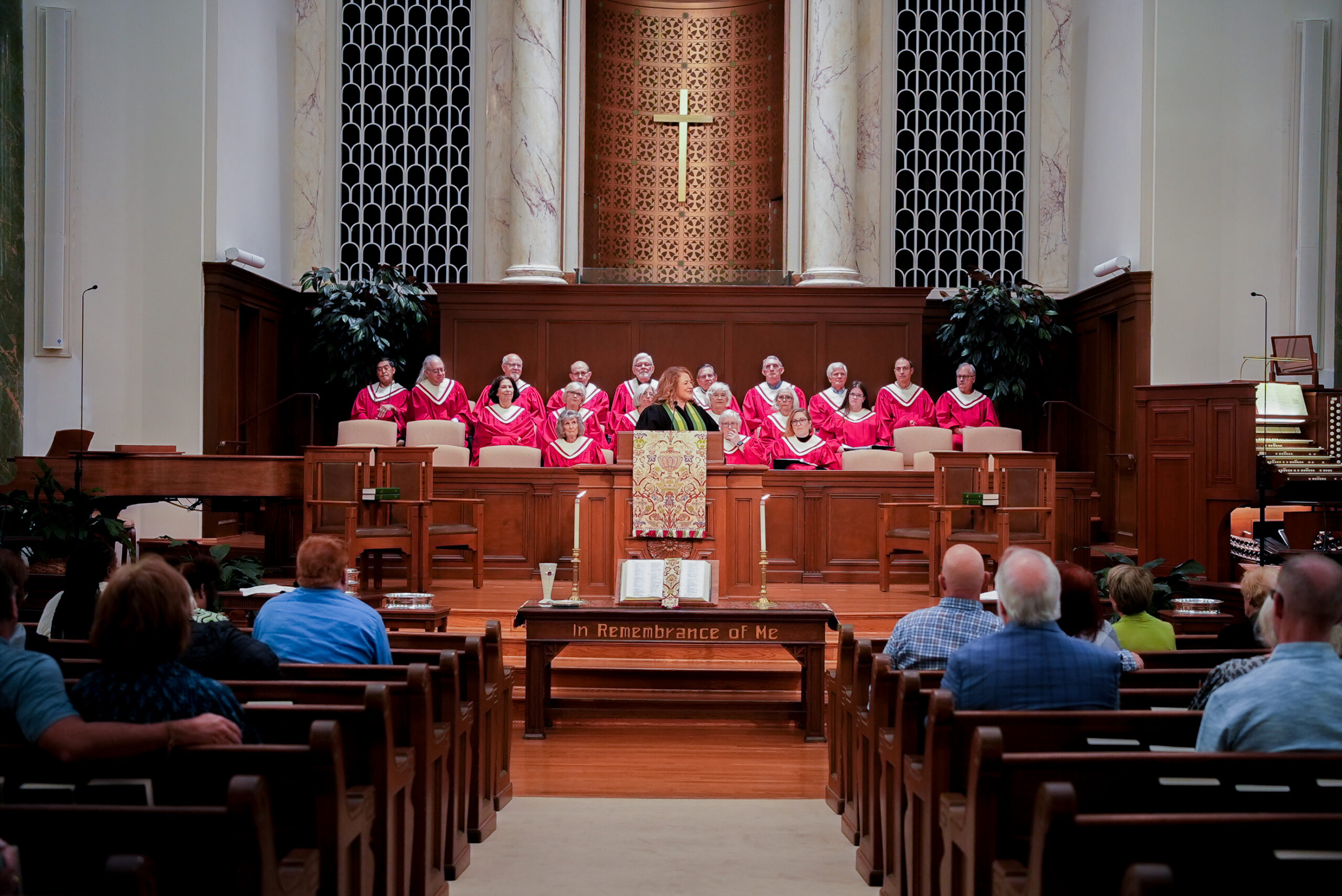I I’ll never forget that journey.
I was a tender 12 years old, and God had called my family to leave our home of sweet small town life in Laurens, South Carolina for the booming metropolis of Knoxville, Tennessee. My dad was to be the new pastor of First Baptist Church in Knoxville, yet all I’d ever known in my growing up years was held in that place. The white brick parsonage on Main Street, just steps away from our church and school and library and drugstore. The yawning trees, under whose shade my curiosity for this world emerged. The nest of friends who inhabited every corner of my life, and without whom I felt entirely untethered. The restaurant on the square, the summer fireworks at the farm, the Friday football games that drew us all in.
Yet as we drove out of town passing those familiar landmarks, I remembered the oak trees that lined our path. Farewell to the trees. Farewell to what I’d known. Farewell to place and home.
II Emerging from the stories of creation, of the curses and challenges of the first humans, this story of Abraham and Sarah begins a remarkable shift in Genesis. We remember from these past few weeks that these early years of humankind were marked with challenge. Adam and Eve are cast out of Eden. Cain kills Abel. The Lord sweeps the world with a flood, saving only Noah and all in his ark. Noah has too much wine and brings dishonor to his family. The descendants try to build a tower to heaven, only to find themselves scattered in language by the Lord who called this place Babel. Terah took his family, including son Abram, Abram’s wife Sarai, and grandson Lot, and left Ur heading to Canaan. A friend of a friend who once served in Iraq says he’s been to Ur and knows exactly why Abram got out of there. It’s a bleak desert place, “as hot as blazes!”1 And where God’s interaction with the world writ large has led to disappointment, the story takes a turn. God chooses one family to be the agents of blessing for the world. God chooses Abram, who had to do nothing but trust God. And that’s where we pick up the story.
But just before we hear the Lord’s words to Abram, we learn that Sarai is without child. Her barrenness here can be read as a state of being, but, like the long line of our mothers of the faith — Sarah, Rebekah, Rachel, Hannah — and like others who have struggled with fertility would tell us, it could also be seen as a metaphor for hopelessness.2 An ending. A certain rootlessness. That which could be but won’t be.
Into that context, the Lord speaks. “Go from your country and your kindred and your father’s house to the land I will show you,” the Lord says. “Go” in the Hebrew is emphatic, sounding to our ears more like “go GO!” Where is Abram to go? What is he to do? Why does he have to leave? Why can’t he stay put? We don’t know. Yet he went – walking away from all he’d known, all that keeps him secure, all that anchored his sense of place in this world. The writer of Hebrews will later tell us that it is “by faith, Abraham settled as an alien in the land promised him.” Indeed, Abram’s risk to go was a risk of faith, a risk laced with the trust of the One who promises.
Because in the Lord’s words, Abraham was to be a source of abundant blessing for the whole world.3 Once anchored in a past filled with known places, familiar commitments, routine rhythms, he now was to set forth into a future and a land beyond his knowing. Once called Abram and Sarai, they would now be called Abraham and Sarah, “Abraham” meaning “father of a multitude.” Once without child, Abraham will be offered the promise of a great nation. “I will bless you,” the Lord says, “so that you will be a blessing.” In Abram’s transformation, possibility. In his places of scarcity, abundance. In endings, beginnings. In death, resurrection. In blessing, promise. III.
As I prepared for today’s sermon, I found myself remembering echoes of last year’s language of being ‘on the way,’ and the weeks we spent talking about the journeys of this life. There’s not a one among us who hasn’t felt summoned from one place into another, is there? That place may not be geographic – it could be spiritual or emotional too, of course. That place from which we’re called might be a stuck place, an isolated place, a place where we know we’re not living into the fullness of who God is calling us to be but one where leaving it feels just outside of reach. You might hear yourself wrestling with it: “I could never leave North Carolina!” “I can’t vote for this candidate!” “I can hardly imagine my life where I’m actually living true to myself.” “If I left, it would upend my world as I’ve always known it.” And so stasis settles in. Apathy takes the wheel. Fear never leaves our side. And we nestle into what may feel comfortable at the time, but a place we’ll soon find out is absent the promise of what could be.
You know those stuck places. Perhaps the stuck place is a job you know you should leave, or a relationship that is taking away your joy, or a habit that always leaves you feeling worse. Perhaps the stuck place is a way of thinking that no longer serves you, a way of acting in your family, among your friends, at work that betrays the you you long to be, a theology that now constricts rather than tethers, an endless quest for more – more money, more influence, more power, more things – that empties you of meaning. Perhaps the stuck place is barren of soul, desolate of Spirit, infertile of hope.
We get stuck as individuals, of course, but we can get stuck as communities. Churches get stuck in scarcity, in the ways things always have been, in fear about all the changes in the world and where they will find themselves when the dust settles. Parents get stuck in anxiety, worrying about their kids’ safety in an endless cycle of BPA-free bottles and bulletproof backpacks and heavily moderated playdates. Those with privilege get stuck in the power they’ve accumulated, hanging on for dear life lest it be lost. Countries – even beloved yet imperfect ones like our own – get stuck in stories that no longer serve the broader vision of who we can be.
I learned a great phrase this week from the beloved theologian Oswald Chambers, who once said: “sit loose to things.”4 Sit loose to things! It resonates with us, because we know that stuck places are “sitting tight” places. They’re the spots where our grip clinches on for dear life, where we clutch our neighborhood, our profession, our money, our worldview, all for dear life. And yet “dear life” is precisely what we lose without loosening that grip.
Walter Brueggemann reminds us that “to stay in safety is to remain barren; to leave in risk is to have hope.”5Isn’t that the journey of faith?Isn’t that what Jesus means when he calls us, saying “follow me”?Isn’t that the call of discipleship, the call to the table, the call to our neighbor, the call to proclaim good news to all creation?Isn’t taking the first step on the journey the very thing that loosens the chest, that unwinds the fear, that unfurls the holy way before you and all it will hold?
So go, the Lord says. Unstick yourselves from all you think impossible to unbind. Sit loose to the things of this world so that you can walk free on the way I have set before you. Trust that I will show you it again and again and again. It will be a way filled with promise, with blessing, with hope. Leave in risk with hope for where I will lead.
III It’s a fool’s errand to look back on one’s life and try to imagine the shape of your life if one decision was different, if you’d just taken another path. It’s hard for me to look back at our life in Laurens and imagine where I would be now had we not ever left. But I do know this – if we hadn’t moved to Knoxville, I would never have been a student at Bearden High School where I met one Josh McGee in acting class, and the life we now know would not have been. I would have never had the voice teacher who told me that I needed to sing, which took me to Furman and Northwestern pursuing a dream, and where later, in the landscape of Chicago, I heard God calling me to ministry. I would never have sat in the sanctuary of First Baptist Knoxville and recognized its architectural sister when I walked into these doors for the first time and found myself coming home again. Was it worth the risk?I’d say so.
IV “It’s a hard thing,” Barbara Brown Taylor reminds us, “to believe in a promise – to live by it, day after day, to see it in the night sky and hear it in your name and see it again in your lover’s eyes. It is a hard thing, to believe in a promise with no power to make it come true. Everything is in the future tense – the land, the son, the blessing. Everything will happen, by and by, but in the meantime what is there to live on now? And yet,” she continues, “what better way to live than in the grip of a promise, and a divine one at that?6
Friends, what better way to live than relieving yourself of the stuck places, sitting loose with all you have and hold, so that you might live in the grip of God’s promise? What more life-giving way to shape your days than living out the blessing and promise God has extended to you?It may not be as grand as setting forth to a land yet unknown, but it might be! It might look like rising each day expecting the holy winds of God to blow through your life. To move through your daily rhythms, alive and aware of what you might discover. To love freely, to give generously, to serve thoughtfully, to risk boldly. To look for rainbows and build arks of community, to remember that you have been created and called very good, to trust that God will never leave you. “To live like that,” Barbara Brown Taylor says, “is to discover that the blessing is not future but now. The promise may not fully be in hand. It may still on the way, but to live reverently, deliberately, and fully awake – that is what it means to live in the promise, where the wait itself is as rich as its end.”7It’s a risk worth taking. Are you willing?





